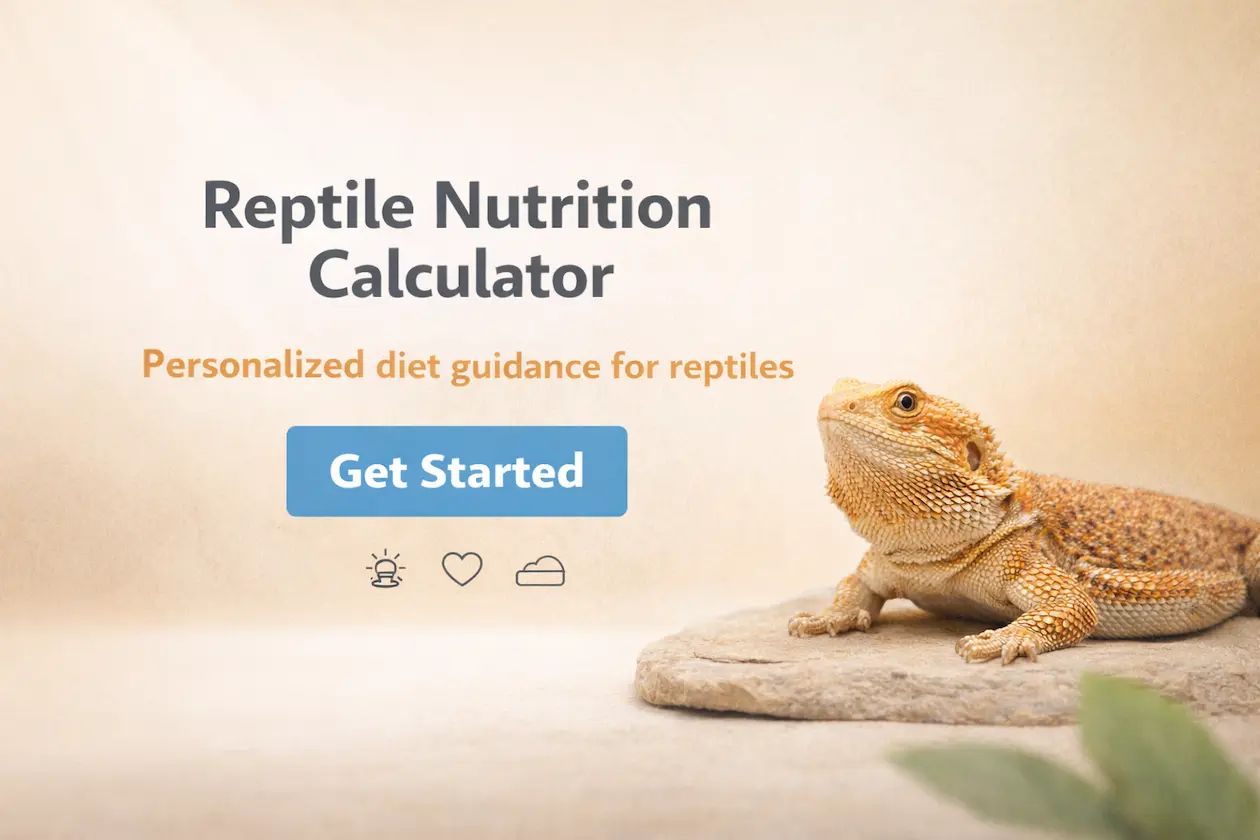Bird Nutrition Calculator | Bird Calorie Calculator - Free Tool
Free bird nutrition calculator and calorie tool. Calculate your bird
This tool helps estimate the daily calorie requirements for your reptile based on their weight, species, age, feeding frequency, temperature gradient, and UVB exposure.
Simply fill out the fields and click Calculate to get started.
If unsure about the temperature gradient or UVB exposure, the default values of 75°F for cool side, 90°F for warm side, and 10 hours of UVB exposure per day will be used.

| Species | Description | Feeding Frequency |
|---|---|---|
| Bearded Dragon | A popular pet reptile known for its distinctive beard and omnivorous diet. | Varies; typically daily to every other day, depending on age and size. |
| Leopard Gecko | A small, nocturnal lizard with a spotted pattern and a diet primarily of insects. | Varies; typically every 2-3 days, adjust based on appetite and health. |
| Ball Python | A non-venomous snake known for its docile nature and ability to coil into a tight ball. | Varies; typically every 5-7 days, adjust based on age, size, and metabolism. |
| Corn Snake | A slender, brightly colored snake native to North America, popular in the pet trade. | Varies; typically every 5-10 days, adjust based on size and health. |
| Tortoise | A land-dwelling reptile with a shell, known for longevity and herbivorous diet. | Varies; typically every 1-3 days for juveniles, less frequently for adults. |
| Iguana | A large, herbivorous lizard native to Central and South America, requiring UVB light. | Varies; typically daily to every other day, adjust based on age, size, and diet. |
| Chameleon | A lizard with the ability to change color, known for its long, sticky tongue and insectivorous diet. | Varies; typically every 1-2 days, adjust based on size, health, and activity. |
| Monitor Lizard | Large, carnivorous lizards found in various parts of the world, requiring spacious enclosures. | Varies; typically every 5-14 days, adjust based on size, age, and diet. |
| Factor | Description |
|---|---|
| Weight | The reptile's weight in pounds (lbs), used to calculate base calorie needs. |
| Species | Select the reptile species from the dropdown list; different species have different calorie requirements. |
| Age | Reptile's age in years, influencing calorie needs (young reptiles typically need more). |
| Feeding Frequency | How often the reptile is fed per week, affecting total daily calorie intake. |
| Temperature | Provide the average daily temperatures of the enclosure to adjust calorie needs based on metabolic rate. |
| UVB Exposure | The daily duration of UVB light exposure, crucial for calcium metabolism and overall health. |
The ideal diet for your reptile depends on its species. Research or consult a vet to understand the specific dietary needs of your reptile, which may include insects, leafy greens, or commercial reptile food.
Feeding frequency varies by species and age. Some reptiles require daily feeding, while others may only need food a few times a week. Consult guidelines specific to your reptile species.
Reptiles need a balanced diet including proteins, fats, vitamins, and minerals. Key nutrients can vary significantly depending on the species.
Signs of nutritional issues in reptiles include lethargy, abnormal shedding, weight loss, and changes in skin color or texture. Consult a vet if you notice any of these symptoms.
For specific health conditions, dietary modifications may be necessary. Consult a vet for a tailored diet plan that addresses your reptile’s health needs.
Free bird nutrition calculator and calorie tool. Calculate your bird
Free cat food carbohydrate calculator. Calculate the carbohydrate content in your cat\
Free cat nutrition calculator and calorie tool. Calculate your cat\
FAQs
The ideal diet for your reptile depends on its species. Research or consult a vet to understand the specific dietary needs of your reptile, which may include insects, leafy greens, or commercial reptile food.
Feeding frequency varies by species and age. Some reptiles require daily feeding, while others may only need food a few times a week. Consult guidelines specific to your reptile species.
Reptiles need a balanced diet including proteins, fats, vitamins, and minerals. Key nutrients can vary significantly depending on the species.
Signs of nutritional issues in reptiles include lethargy, abnormal shedding, weight loss, and changes in skin color or texture. Consult a vet if you notice any of these symptoms.
For specific health conditions, dietary modifications may be necessary. Consult a vet for a tailored diet plan that addresses your reptile's health needs.